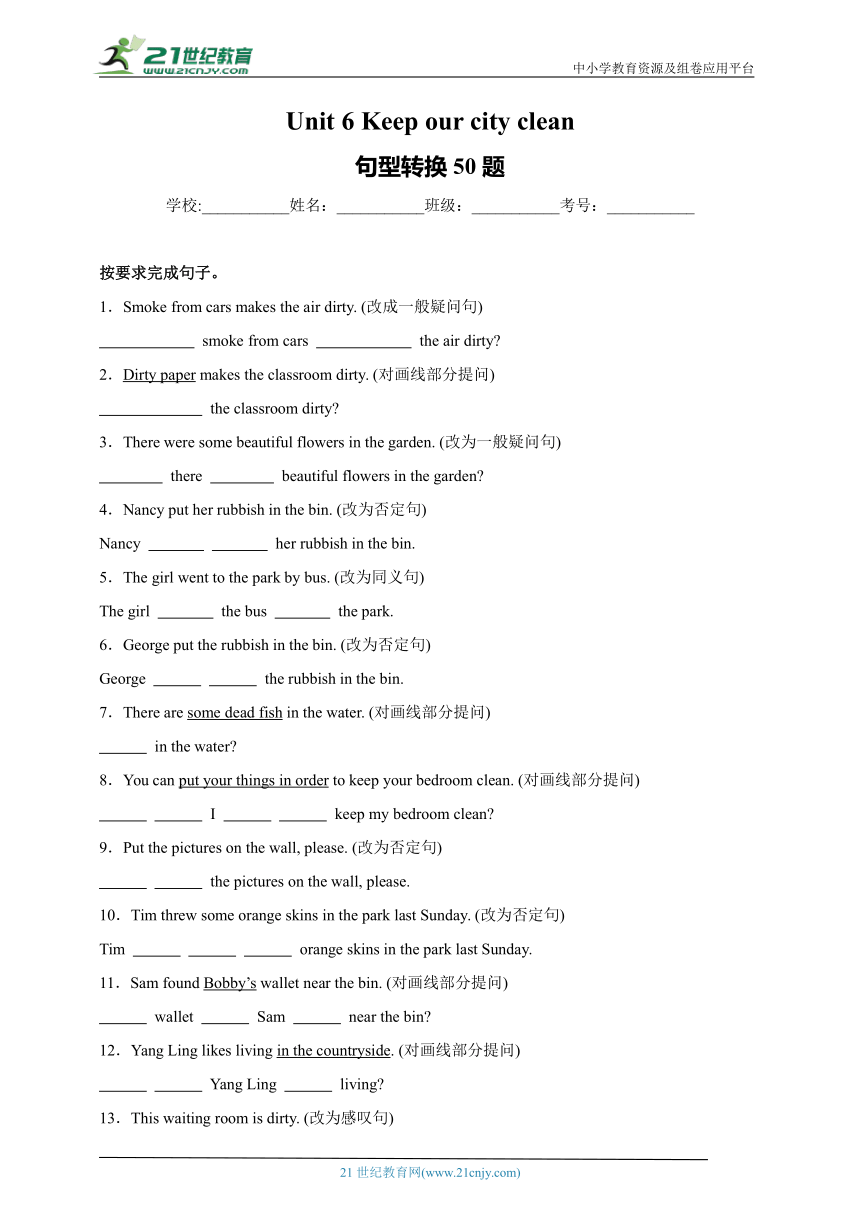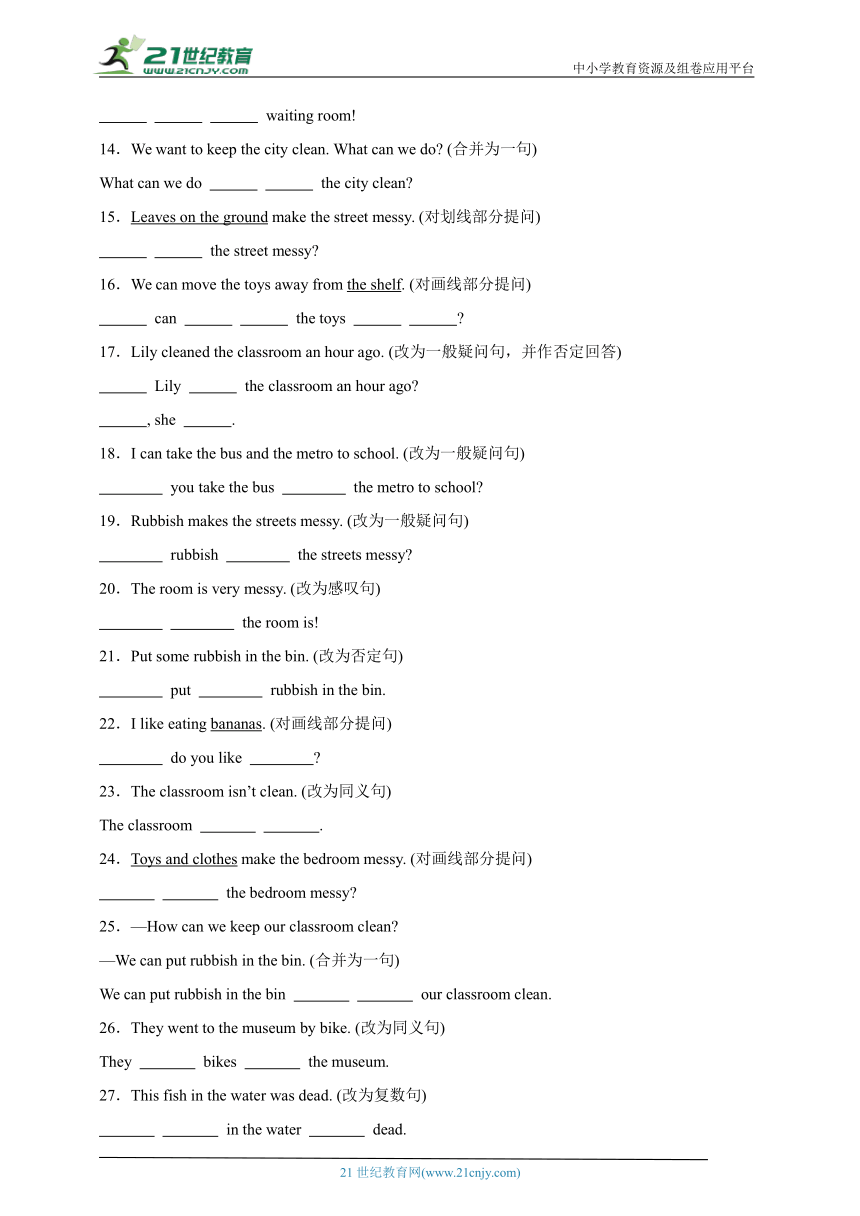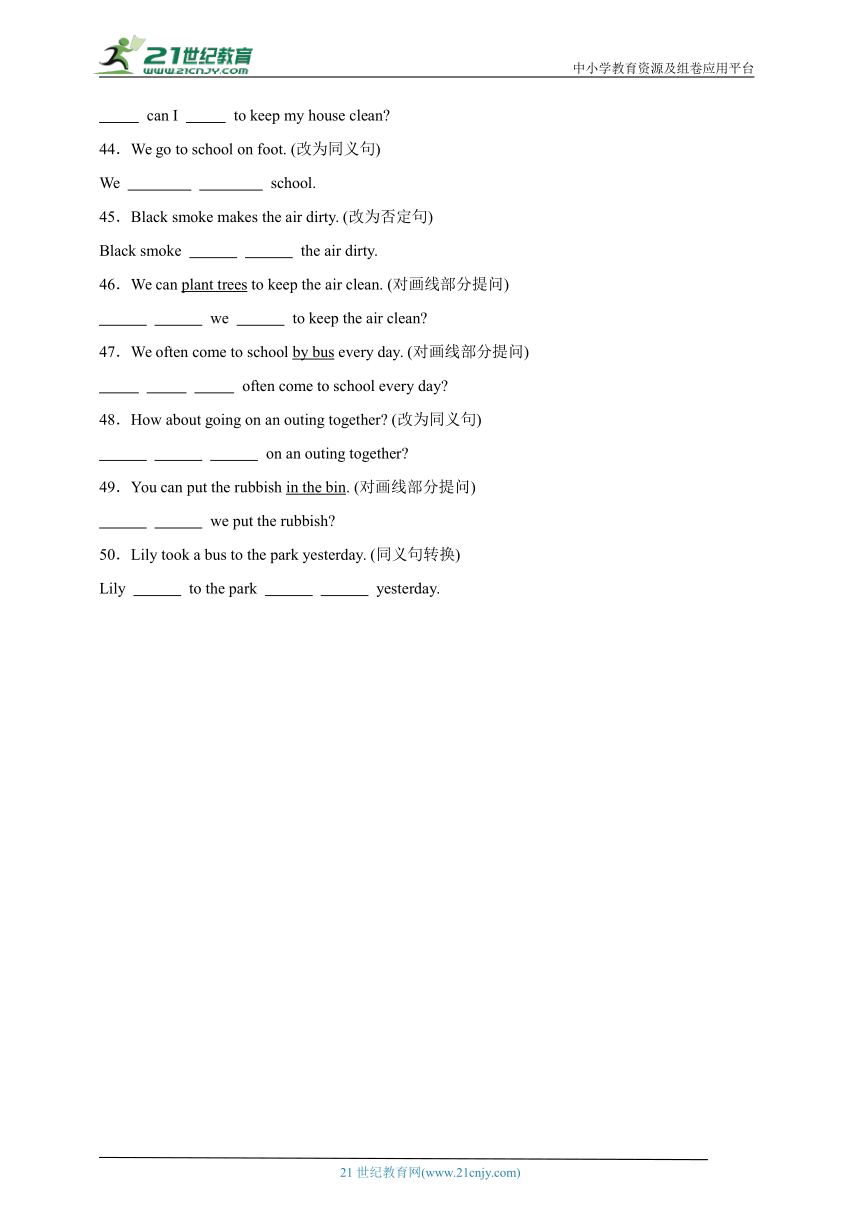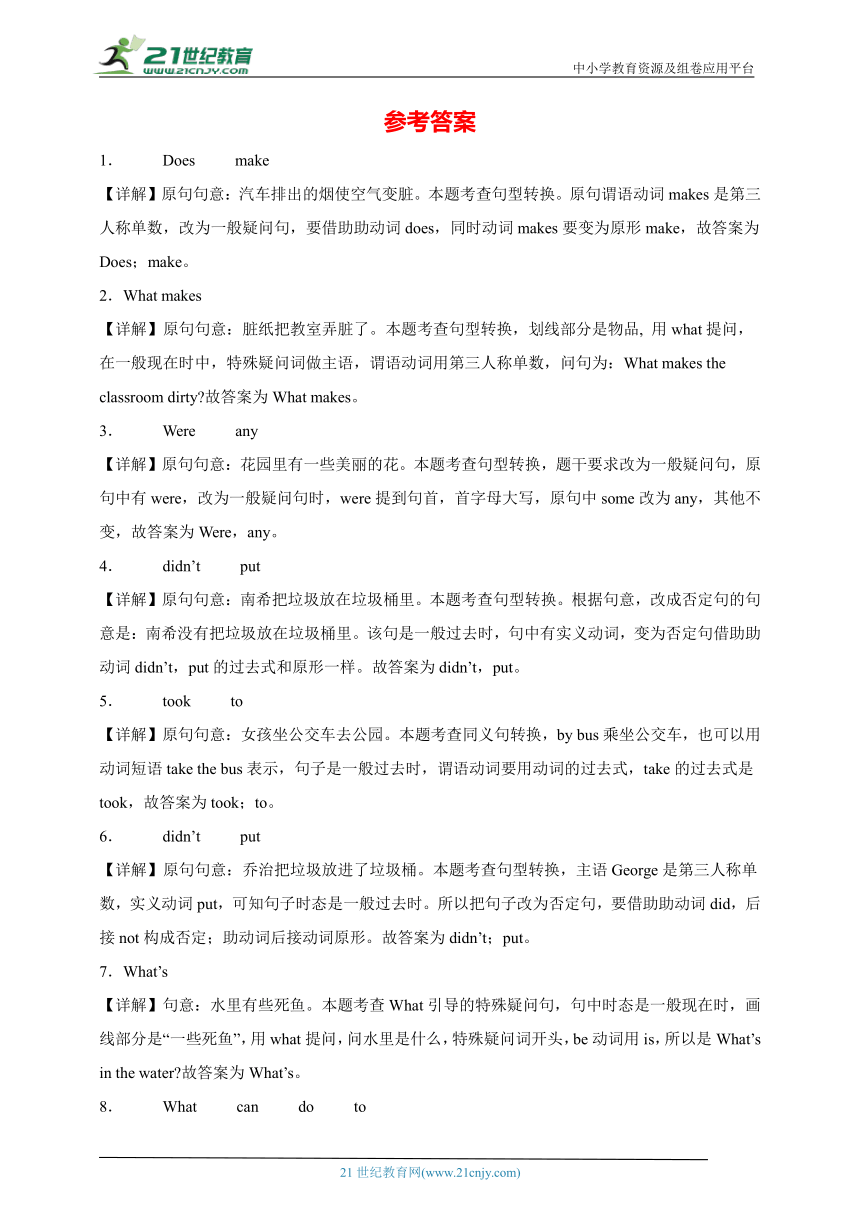Unit 6 Keep our city clean句型转换50题(含解析)-2024-2025学年小学英语六年级上册单元专项练习(译林版三起)
文档属性
| 名称 | Unit 6 Keep our city clean句型转换50题(含解析)-2024-2025学年小学英语六年级上册单元专项练习(译林版三起) |  | |
| 格式 | docx | ||
| 文件大小 | 285.9KB | ||
| 资源类型 | 试卷 | ||
| 版本资源 | 牛津译林版 | ||
| 科目 | 英语 | ||
| 更新时间 | 2024-11-08 15:37:12 | ||
图片预览





文档简介
中小学教育资源及组卷应用平台
Unit 6 Keep our city clean
句型转换50题
学校:___________姓名:___________班级:___________考号:___________
按要求完成句子。
1.Smoke from cars makes the air dirty. (改成一般疑问句)
smoke from cars the air dirty
2.Dirty paper makes the classroom dirty. (对画线部分提问)
the classroom dirty
3.There were some beautiful flowers in the garden. (改为一般疑问句)
there beautiful flowers in the garden
4.Nancy put her rubbish in the bin. (改为否定句)
Nancy her rubbish in the bin.
5.The girl went to the park by bus. (改为同义句)
The girl the bus the park.
6.George put the rubbish in the bin. (改为否定句)
George the rubbish in the bin.
7.There are some dead fish in the water. (对画线部分提问)
in the water
8.You can put your things in order to keep your bedroom clean. (对画线部分提问)
I keep my bedroom clean
9.Put the pictures on the wall, please. (改为否定句)
the pictures on the wall, please.
10.Tim threw some orange skins in the park last Sunday. (改为否定句)
Tim orange skins in the park last Sunday.
11.Sam found Bobby’s wallet near the bin. (对画线部分提问)
wallet Sam near the bin
12.Yang Ling likes living in the countryside. (对画线部分提问)
Yang Ling living
13.This waiting room is dirty. (改为感叹句)
waiting room!
14.We want to keep the city clean. What can we do (合并为一句)
What can we do the city clean
15.Leaves on the ground make the street messy. (对划线部分提问)
the street messy
16.We can move the toys away from the shelf. (对画线部分提问)
can the toys
17.Lily cleaned the classroom an hour ago. (改为一般疑问句,并作否定回答)
Lily the classroom an hour ago
, she .
18.I can take the bus and the metro to school. (改为一般疑问句)
you take the bus the metro to school
19.Rubbish makes the streets messy. (改为一般疑问句)
rubbish the streets messy
20.The room is very messy. (改为感叹句)
the room is!
21.Put some rubbish in the bin. (改为否定句)
put rubbish in the bin.
22.I like eating bananas. (对画线部分提问)
do you like
23.The classroom isn’t clean. (改为同义句)
The classroom .
24.Toys and clothes make the bedroom messy. (对画线部分提问)
the bedroom messy
25.—How can we keep our classroom clean
—We can put rubbish in the bin. (合并为一句)
We can put rubbish in the bin our classroom clean.
26.They went to the museum by bike. (改为同义句)
They bikes the museum.
27.This fish in the water was dead. (改为复数句)
in the water dead.
28.There are no buses in the street. (改为同义句)
There buses in the street.
29.Every student should keep the classroom clean. (对划线部分提问)
should every student
30.He wanted to keep the bedroom clean. He sweep the floor. (合并为一句)
He swept the floor the bedroom clean.
31.Plastic bags make the city messy. (对划线部分提问)
the city messy
32.Helen cleaned the classroom yesterday. (改为一般疑问句)
Helen the classroom yesterday
33.They put rubbish in the bin. (改为否定句)
They rubbish in the bin.
34.My brother puts rubbish on the ground. (改为一般疑问句)
brother rubbish on the ground
35.Smoke makes the air dirty. (对画线部分提问)
the air dirty
36.Our classroom isn’t clean. (同义句转换)
Our classroom .
37.We can sweep the floor to keep our classroom clean. (对画线部分提问)
can to keep our classroom clean
38.We can also walk home after school. (同义句转换)
We can also home after school.
39.Eddie goes to sleep after breakfast. (改为一般疑问句)
Eddie to sleep after breakfast
40.You should throw the rubbish on the floor. (改为否定句)
You the rubbish on the floor.
41.Billy slips on the banana skin. Billy falls on the ground. (合并为一句)
Billy on the banana skin and on the ground.
42.Look at this picture of my family. (改为复数句)
Look at of .
43.You can put the clothes away to keep your house clean. (对划线部分提问)
can I to keep my house clean
44.We go to school on foot. (改为同义句)
We school.
45.Black smoke makes the air dirty. (改为否定句)
Black smoke the air dirty.
46.We can plant trees to keep the air clean. (对画线部分提问)
we to keep the air clean
47.We often come to school by bus every day. (对画线部分提问)
often come to school every day
48.How about going on an outing together (改为同义句)
on an outing together
49.You can put the rubbish in the bin. (对画线部分提问)
we put the rubbish
50.Lily took a bus to the park yesterday. (同义句转换)
Lily to the park yesterday.
参考答案
1. Does make
【详解】原句句意:汽车排出的烟使空气变脏。本题考查句型转换。原句谓语动词makes是第三人称单数,改为一般疑问句,要借助助动词does,同时动词makes要变为原形make,故答案为Does;make。
2.What makes
【详解】原句句意:脏纸把教室弄脏了。本题考查句型转换,划线部分是物品, 用what提问,在一般现在时中,特殊疑问词做主语,谓语动词用第三人称单数,问句为:What makes the classroom dirty 故答案为What makes。
3. Were any
【详解】原句句意:花园里有一些美丽的花。本题考查句型转换,题干要求改为一般疑问句,原句中有were,改为一般疑问句时,were提到句首,首字母大写,原句中some改为any,其他不变,故答案为Were,any。
4. didn’t put
【详解】原句句意:南希把垃圾放在垃圾桶里。本题考查句型转换。根据句意,改成否定句的句意是:南希没有把垃圾放在垃圾桶里。该句是一般过去时,句中有实义动词,变为否定句借助助动词didn’t,put的过去式和原形一样。故答案为didn’t,put。
5. took to
【详解】原句句意:女孩坐公交车去公园。本题考查同义句转换,by bus乘坐公交车,也可以用动词短语take the bus表示,句子是一般过去时,谓语动词要用动词的过去式,take的过去式是took,故答案为took;to。
6. didn’t put
【详解】原句句意:乔治把垃圾放进了垃圾桶。本题考查句型转换,主语George是第三人称单数,实义动词put,可知句子时态是一般过去时。所以把句子改为否定句,要借助助动词did,后接not构成否定;助动词后接动词原形。故答案为didn’t;put。
7.What’s
【详解】句意:水里有些死鱼。本题考查What引导的特殊疑问句,句中时态是一般现在时,画线部分是“一些死鱼”,用what提问,问水里是什么,特殊疑问词开头,be动词用is,所以是What’s in the water 故答案为What’s。
8. What can do to
【详解】原句句意:你可以把你的东西放好以保持你的卧室清洁。本题考查对划线部分提问,对划线部分提问用疑问词what,其结构为特殊疑问词what+一般疑问句。划线部分是动作,用what…do代替,情态动词can放在疑问词的后面,剩余部分照抄,故答案为What;can;do;to。
9. Don’t put
【详解】句意:请把图画帖子墙上。本题考查句型转换。题目要求改为否定句,本题是祈使句,变成否定句,在动词前加don’t,放在句首,首字母要大写,后跟动词原形。故答案为Don’t;put。
10. didn’t throw any
【详解】原句句意:蒂姆上周日在公园里扔了一些橘子皮。本题考查句型转换。原句为含有实义动词的肯定句,时态为一般过去时。改为否定句,实义动词前要加助动词的否定形式didn’t,动词threw变为原形throw,some变为any。故答案为didn’t;throw;any。
11. Whose did find
【详解】原句句意:山姆在垃圾桶旁边发现了鲍比的钱包。本题考查对划线部分提问,对划线部分提问用疑问词whose,其结构为Whose+名词+一般疑问句。句子剩余部分是含有实义动词的一般疑问句,时态是一般过去时,所以did提前,动词用原形find,故答案为Whose;did;find。
12. Where does like
【详解】句意:杨玲喜欢住在农村。本题考查句型转换。in the country是在农村,疑问词用where,放在句首,首字母要大写。剩余部分是变成一般疑问句,需要借助助动词,时态是一般现在时态,主语是第三人称单数,助动词是does,第三人称单数likes还原到原形like,故答案为where;does;like。
13. What a dirty
【详解】原句句意:这个等候室很脏。本题考查句型转换。题目要求改为感叹句。room是可数名词单数,用what引导感叹句,句型结构是what+a/an 形容词+名词+主语+谓语+其他!故答案为What;a;dirty。
14. to keep
【详解】句意:我们想保持城市清洁。我们能做什么?本题考查句型转换,根据句意可知,该句是特殊疑问句,动词不定式表目的,故答案为to;keep。
15. What makes
【详解】句意:地上的树叶把街道弄得乱七八糟。本题考查特殊疑问句的问句,根据句意可知,该句时态为一般现在时,划线部分是物体,用what提问,使make,特殊疑问词作主语,谓语动词用第三人称单数形式makes,故答案为What;makes。
16. Where you move away from
【详解】原句句意:我们可以把玩具从架子上移开。本题考查句型转换,画线部分the shelf是地方,询问地方用特殊疑问词where,第一人称we改为第二人称you,其他的不变,故答案为Where;you;move;away;from。
17. Did clean No didn’t
【详解】原句句意:一小时前丽丽打扫了教室。本题考查句型转换,原句是一般过去时的陈述句,句子中有谓语动词的过去式cleaned,变一般疑问句用助动词Did引导,放于句首,其余部分按顺序放在Did后,同时cleaned变为clean。其否定回答是:No, she didn’t. 故答案为Did,clean,No,didn’t。
18. Can or
【详解】原句句意:我可以乘公共汽车和地铁去学校。本题考查句型转换,改为一般疑问句将can提前,将I改为you,将and改为or。故答案为Can;or。
19. Does make
【详解】句意:垃圾使街道凌乱不堪。本题考查句型转换。这是一般现在时的陈述句,变为一般疑问句,借助于助动词does,因为主语是rubbish,rubbish是不可数名词,Does+主语+动词原形+其他,故答案为Does;make。
20. How messy
【详解】句意:房间很乱。本题考查句型转换。题干要求改为感叹句,其结构为:How+形容词+主语+谓语!或What+冠词+可数名词+谓语!messy杂乱的,根据后面的the room is可知,已有主语和谓语,故用How+形容词+主语+谓语!的结构。故答案为How;messy。
21. Don’t any
【详解】原句句意:把垃圾放进垃圾箱里。本题考查句型转换,该句是祈使句,改为否定句在句首加Don’t,将some改为any。故答案为Don’t;any。
22. What eating
【详解】原句句意:我喜欢吃香蕉。本题考查特殊疑问句,画线部分是bananas,用What提问,后跟一般疑问句。故答案为What;eating。
23. is dirty
【详解】句意:教室不干净。本题考查句型转换,不干净的dirty,否定句变成肯定句要把isn’t变成is,其同义句是:The classroom is dirty,故答案为is;dirty。
24. What makes
【详解】原句句意:玩具和衣服使卧室凌乱不堪。本题考查特殊疑问句,画线部分是使卧室凌乱不堪的物品,用what提问,what做主语,句子是一般现在时,后面的动词用第三人称单数形式makes,故答案为What,makes。
25. to keep
【详解】原句句意:—我们如何保持教室清洁?—我们可以把垃圾放进垃圾箱。本题考查句型转换。题干要求合并为一句,合并后句子为:我们可以把垃圾放进垃圾箱以保持教室的清洁。所以“我们可以把垃圾放进垃圾箱”的目的是“保持教室的清洁”,用动词不定式表目的,to keep以保持,故答案为to;keep。
26. rode to
【详解】原句句意:他们骑自行车去博物馆。本题考查句型转换,题干要求改为同义句,went to the museum by bike可替换为rode bikes to the museum,rode是ride的过去式,故答案为rode,to。
27. These fish were
【详解】句意:水里的鱼死了。本题考查句型转换,this的复数形式these,且首字母大写,fish的复数形式fish,单复同形,was的复数形式were,故答案为These;fish;were。
28. aren't any
【详解】句意:大街上没有公共汽车。改为同义句将no改为not any,are not可缩写为aren't。故答案为aren't;any。
29. What do
【详解】原句句意:每个学生都应该保持教室干净。划线部分是动作用what提问,用do替换,故答案为What;do。
【点睛】
30. to keep
【详解】原句句意:他想保持卧室干净。他扫地。根据原句句意可知合并后的句子含义为:他扫地以保持卧室干净。保持keep,动词不定式表示目的,故此处用动词不定式to keep,故答案为to;keep。
【点睛】
31. What makes
【详解】原句句意:塑料袋使这个城市变得脏乱。划线部分是Plastic bags,故用what什么提问,作主语,故谓语动词用第三人称单数形式,故答案为What;makes。
32. Did clean
【解析】略
33. don’t/didn't put
【解析】略
34. Does your put
【详解】考查一般疑问句。原句是一般现在时的陈述句,句子中有谓语动词的第三人称单数puts,变一般疑问用助动词Does引导,放于句首,其余部分按顺序放在Does后,同时puts变为put,My变为your,句末加问号。原句变为的一般疑问句就是:Does your brother put rubbish on the ground 故答案为:Does your; put。
35. What makes
【解析】略
36. is dirty
【解析】略
37. What you do
【解析】略
38. go on foot
【解析】略
39. Does go
【详解】此句改为一般疑问句时要借助于助动词does, 后面动词用原形。
40. shouldn’t throw
【详解】原句句意:你应该在地板上扔垃圾。含有情态动词should的肯定句变否定句,直接在情态动词should后加not,should not=shouldn't,故答案为shouldn't,throw。
【点睛】
41. slips falls
【详解】原句句意:比利踩在香蕉皮上滑倒了。比利摔倒在地上。合并为一句话用and连接,共用一个主语,故答案为slips,falls。
【点睛】
42. these pictures my family
【详解】原句句意:看看这张我家的照片。改为复数句,this变these,picture变pictures,故答案为these,pictures,my,family。
【点睛】
43. What do
【详解】原句句意:你可以把衣服收起来以保持房子干净。画线部分是做的事情,用what提问,画线部分用do代替,故答案为What,do。
【点睛】
44. walk to
【解析】略
45. doesn’t make
【解析】略
46. What can do
【解析】略
47. How do you
【详解】原句句意:我们经常每天乘坐公共汽车来学校。画线部分是“by bus”,为方式,所以用how提问,由句中的often可知是一般现在时,主语是we,转换成特殊疑问句,主语用you,表示你们。故答案为How;do;you。
48. What about going
【详解】原句句意:一起去郊游怎么样?本题考查句型转换。how about = what about 怎么样,如何。what about+动名词。故答案为What;about;going。
49. Where can
【解析】略
50. went by bus
【解析】略
21世纪教育网 www.21cnjy.com 精品试卷·第 2 页 (共 2 页)
21世纪教育网(www.21cnjy.com)
Unit 6 Keep our city clean
句型转换50题
学校:___________姓名:___________班级:___________考号:___________
按要求完成句子。
1.Smoke from cars makes the air dirty. (改成一般疑问句)
smoke from cars the air dirty
2.Dirty paper makes the classroom dirty. (对画线部分提问)
the classroom dirty
3.There were some beautiful flowers in the garden. (改为一般疑问句)
there beautiful flowers in the garden
4.Nancy put her rubbish in the bin. (改为否定句)
Nancy her rubbish in the bin.
5.The girl went to the park by bus. (改为同义句)
The girl the bus the park.
6.George put the rubbish in the bin. (改为否定句)
George the rubbish in the bin.
7.There are some dead fish in the water. (对画线部分提问)
in the water
8.You can put your things in order to keep your bedroom clean. (对画线部分提问)
I keep my bedroom clean
9.Put the pictures on the wall, please. (改为否定句)
the pictures on the wall, please.
10.Tim threw some orange skins in the park last Sunday. (改为否定句)
Tim orange skins in the park last Sunday.
11.Sam found Bobby’s wallet near the bin. (对画线部分提问)
wallet Sam near the bin
12.Yang Ling likes living in the countryside. (对画线部分提问)
Yang Ling living
13.This waiting room is dirty. (改为感叹句)
waiting room!
14.We want to keep the city clean. What can we do (合并为一句)
What can we do the city clean
15.Leaves on the ground make the street messy. (对划线部分提问)
the street messy
16.We can move the toys away from the shelf. (对画线部分提问)
can the toys
17.Lily cleaned the classroom an hour ago. (改为一般疑问句,并作否定回答)
Lily the classroom an hour ago
, she .
18.I can take the bus and the metro to school. (改为一般疑问句)
you take the bus the metro to school
19.Rubbish makes the streets messy. (改为一般疑问句)
rubbish the streets messy
20.The room is very messy. (改为感叹句)
the room is!
21.Put some rubbish in the bin. (改为否定句)
put rubbish in the bin.
22.I like eating bananas. (对画线部分提问)
do you like
23.The classroom isn’t clean. (改为同义句)
The classroom .
24.Toys and clothes make the bedroom messy. (对画线部分提问)
the bedroom messy
25.—How can we keep our classroom clean
—We can put rubbish in the bin. (合并为一句)
We can put rubbish in the bin our classroom clean.
26.They went to the museum by bike. (改为同义句)
They bikes the museum.
27.This fish in the water was dead. (改为复数句)
in the water dead.
28.There are no buses in the street. (改为同义句)
There buses in the street.
29.Every student should keep the classroom clean. (对划线部分提问)
should every student
30.He wanted to keep the bedroom clean. He sweep the floor. (合并为一句)
He swept the floor the bedroom clean.
31.Plastic bags make the city messy. (对划线部分提问)
the city messy
32.Helen cleaned the classroom yesterday. (改为一般疑问句)
Helen the classroom yesterday
33.They put rubbish in the bin. (改为否定句)
They rubbish in the bin.
34.My brother puts rubbish on the ground. (改为一般疑问句)
brother rubbish on the ground
35.Smoke makes the air dirty. (对画线部分提问)
the air dirty
36.Our classroom isn’t clean. (同义句转换)
Our classroom .
37.We can sweep the floor to keep our classroom clean. (对画线部分提问)
can to keep our classroom clean
38.We can also walk home after school. (同义句转换)
We can also home after school.
39.Eddie goes to sleep after breakfast. (改为一般疑问句)
Eddie to sleep after breakfast
40.You should throw the rubbish on the floor. (改为否定句)
You the rubbish on the floor.
41.Billy slips on the banana skin. Billy falls on the ground. (合并为一句)
Billy on the banana skin and on the ground.
42.Look at this picture of my family. (改为复数句)
Look at of .
43.You can put the clothes away to keep your house clean. (对划线部分提问)
can I to keep my house clean
44.We go to school on foot. (改为同义句)
We school.
45.Black smoke makes the air dirty. (改为否定句)
Black smoke the air dirty.
46.We can plant trees to keep the air clean. (对画线部分提问)
we to keep the air clean
47.We often come to school by bus every day. (对画线部分提问)
often come to school every day
48.How about going on an outing together (改为同义句)
on an outing together
49.You can put the rubbish in the bin. (对画线部分提问)
we put the rubbish
50.Lily took a bus to the park yesterday. (同义句转换)
Lily to the park yesterday.
参考答案
1. Does make
【详解】原句句意:汽车排出的烟使空气变脏。本题考查句型转换。原句谓语动词makes是第三人称单数,改为一般疑问句,要借助助动词does,同时动词makes要变为原形make,故答案为Does;make。
2.What makes
【详解】原句句意:脏纸把教室弄脏了。本题考查句型转换,划线部分是物品, 用what提问,在一般现在时中,特殊疑问词做主语,谓语动词用第三人称单数,问句为:What makes the classroom dirty 故答案为What makes。
3. Were any
【详解】原句句意:花园里有一些美丽的花。本题考查句型转换,题干要求改为一般疑问句,原句中有were,改为一般疑问句时,were提到句首,首字母大写,原句中some改为any,其他不变,故答案为Were,any。
4. didn’t put
【详解】原句句意:南希把垃圾放在垃圾桶里。本题考查句型转换。根据句意,改成否定句的句意是:南希没有把垃圾放在垃圾桶里。该句是一般过去时,句中有实义动词,变为否定句借助助动词didn’t,put的过去式和原形一样。故答案为didn’t,put。
5. took to
【详解】原句句意:女孩坐公交车去公园。本题考查同义句转换,by bus乘坐公交车,也可以用动词短语take the bus表示,句子是一般过去时,谓语动词要用动词的过去式,take的过去式是took,故答案为took;to。
6. didn’t put
【详解】原句句意:乔治把垃圾放进了垃圾桶。本题考查句型转换,主语George是第三人称单数,实义动词put,可知句子时态是一般过去时。所以把句子改为否定句,要借助助动词did,后接not构成否定;助动词后接动词原形。故答案为didn’t;put。
7.What’s
【详解】句意:水里有些死鱼。本题考查What引导的特殊疑问句,句中时态是一般现在时,画线部分是“一些死鱼”,用what提问,问水里是什么,特殊疑问词开头,be动词用is,所以是What’s in the water 故答案为What’s。
8. What can do to
【详解】原句句意:你可以把你的东西放好以保持你的卧室清洁。本题考查对划线部分提问,对划线部分提问用疑问词what,其结构为特殊疑问词what+一般疑问句。划线部分是动作,用what…do代替,情态动词can放在疑问词的后面,剩余部分照抄,故答案为What;can;do;to。
9. Don’t put
【详解】句意:请把图画帖子墙上。本题考查句型转换。题目要求改为否定句,本题是祈使句,变成否定句,在动词前加don’t,放在句首,首字母要大写,后跟动词原形。故答案为Don’t;put。
10. didn’t throw any
【详解】原句句意:蒂姆上周日在公园里扔了一些橘子皮。本题考查句型转换。原句为含有实义动词的肯定句,时态为一般过去时。改为否定句,实义动词前要加助动词的否定形式didn’t,动词threw变为原形throw,some变为any。故答案为didn’t;throw;any。
11. Whose did find
【详解】原句句意:山姆在垃圾桶旁边发现了鲍比的钱包。本题考查对划线部分提问,对划线部分提问用疑问词whose,其结构为Whose+名词+一般疑问句。句子剩余部分是含有实义动词的一般疑问句,时态是一般过去时,所以did提前,动词用原形find,故答案为Whose;did;find。
12. Where does like
【详解】句意:杨玲喜欢住在农村。本题考查句型转换。in the country是在农村,疑问词用where,放在句首,首字母要大写。剩余部分是变成一般疑问句,需要借助助动词,时态是一般现在时态,主语是第三人称单数,助动词是does,第三人称单数likes还原到原形like,故答案为where;does;like。
13. What a dirty
【详解】原句句意:这个等候室很脏。本题考查句型转换。题目要求改为感叹句。room是可数名词单数,用what引导感叹句,句型结构是what+a/an 形容词+名词+主语+谓语+其他!故答案为What;a;dirty。
14. to keep
【详解】句意:我们想保持城市清洁。我们能做什么?本题考查句型转换,根据句意可知,该句是特殊疑问句,动词不定式表目的,故答案为to;keep。
15. What makes
【详解】句意:地上的树叶把街道弄得乱七八糟。本题考查特殊疑问句的问句,根据句意可知,该句时态为一般现在时,划线部分是物体,用what提问,使make,特殊疑问词作主语,谓语动词用第三人称单数形式makes,故答案为What;makes。
16. Where you move away from
【详解】原句句意:我们可以把玩具从架子上移开。本题考查句型转换,画线部分the shelf是地方,询问地方用特殊疑问词where,第一人称we改为第二人称you,其他的不变,故答案为Where;you;move;away;from。
17. Did clean No didn’t
【详解】原句句意:一小时前丽丽打扫了教室。本题考查句型转换,原句是一般过去时的陈述句,句子中有谓语动词的过去式cleaned,变一般疑问句用助动词Did引导,放于句首,其余部分按顺序放在Did后,同时cleaned变为clean。其否定回答是:No, she didn’t. 故答案为Did,clean,No,didn’t。
18. Can or
【详解】原句句意:我可以乘公共汽车和地铁去学校。本题考查句型转换,改为一般疑问句将can提前,将I改为you,将and改为or。故答案为Can;or。
19. Does make
【详解】句意:垃圾使街道凌乱不堪。本题考查句型转换。这是一般现在时的陈述句,变为一般疑问句,借助于助动词does,因为主语是rubbish,rubbish是不可数名词,Does+主语+动词原形+其他,故答案为Does;make。
20. How messy
【详解】句意:房间很乱。本题考查句型转换。题干要求改为感叹句,其结构为:How+形容词+主语+谓语!或What+冠词+可数名词+谓语!messy杂乱的,根据后面的the room is可知,已有主语和谓语,故用How+形容词+主语+谓语!的结构。故答案为How;messy。
21. Don’t any
【详解】原句句意:把垃圾放进垃圾箱里。本题考查句型转换,该句是祈使句,改为否定句在句首加Don’t,将some改为any。故答案为Don’t;any。
22. What eating
【详解】原句句意:我喜欢吃香蕉。本题考查特殊疑问句,画线部分是bananas,用What提问,后跟一般疑问句。故答案为What;eating。
23. is dirty
【详解】句意:教室不干净。本题考查句型转换,不干净的dirty,否定句变成肯定句要把isn’t变成is,其同义句是:The classroom is dirty,故答案为is;dirty。
24. What makes
【详解】原句句意:玩具和衣服使卧室凌乱不堪。本题考查特殊疑问句,画线部分是使卧室凌乱不堪的物品,用what提问,what做主语,句子是一般现在时,后面的动词用第三人称单数形式makes,故答案为What,makes。
25. to keep
【详解】原句句意:—我们如何保持教室清洁?—我们可以把垃圾放进垃圾箱。本题考查句型转换。题干要求合并为一句,合并后句子为:我们可以把垃圾放进垃圾箱以保持教室的清洁。所以“我们可以把垃圾放进垃圾箱”的目的是“保持教室的清洁”,用动词不定式表目的,to keep以保持,故答案为to;keep。
26. rode to
【详解】原句句意:他们骑自行车去博物馆。本题考查句型转换,题干要求改为同义句,went to the museum by bike可替换为rode bikes to the museum,rode是ride的过去式,故答案为rode,to。
27. These fish were
【详解】句意:水里的鱼死了。本题考查句型转换,this的复数形式these,且首字母大写,fish的复数形式fish,单复同形,was的复数形式were,故答案为These;fish;were。
28. aren't any
【详解】句意:大街上没有公共汽车。改为同义句将no改为not any,are not可缩写为aren't。故答案为aren't;any。
29. What do
【详解】原句句意:每个学生都应该保持教室干净。划线部分是动作用what提问,用do替换,故答案为What;do。
【点睛】
30. to keep
【详解】原句句意:他想保持卧室干净。他扫地。根据原句句意可知合并后的句子含义为:他扫地以保持卧室干净。保持keep,动词不定式表示目的,故此处用动词不定式to keep,故答案为to;keep。
【点睛】
31. What makes
【详解】原句句意:塑料袋使这个城市变得脏乱。划线部分是Plastic bags,故用what什么提问,作主语,故谓语动词用第三人称单数形式,故答案为What;makes。
32. Did clean
【解析】略
33. don’t/didn't put
【解析】略
34. Does your put
【详解】考查一般疑问句。原句是一般现在时的陈述句,句子中有谓语动词的第三人称单数puts,变一般疑问用助动词Does引导,放于句首,其余部分按顺序放在Does后,同时puts变为put,My变为your,句末加问号。原句变为的一般疑问句就是:Does your brother put rubbish on the ground 故答案为:Does your; put。
35. What makes
【解析】略
36. is dirty
【解析】略
37. What you do
【解析】略
38. go on foot
【解析】略
39. Does go
【详解】此句改为一般疑问句时要借助于助动词does, 后面动词用原形。
40. shouldn’t throw
【详解】原句句意:你应该在地板上扔垃圾。含有情态动词should的肯定句变否定句,直接在情态动词should后加not,should not=shouldn't,故答案为shouldn't,throw。
【点睛】
41. slips falls
【详解】原句句意:比利踩在香蕉皮上滑倒了。比利摔倒在地上。合并为一句话用and连接,共用一个主语,故答案为slips,falls。
【点睛】
42. these pictures my family
【详解】原句句意:看看这张我家的照片。改为复数句,this变these,picture变pictures,故答案为these,pictures,my,family。
【点睛】
43. What do
【详解】原句句意:你可以把衣服收起来以保持房子干净。画线部分是做的事情,用what提问,画线部分用do代替,故答案为What,do。
【点睛】
44. walk to
【解析】略
45. doesn’t make
【解析】略
46. What can do
【解析】略
47. How do you
【详解】原句句意:我们经常每天乘坐公共汽车来学校。画线部分是“by bus”,为方式,所以用how提问,由句中的often可知是一般现在时,主语是we,转换成特殊疑问句,主语用you,表示你们。故答案为How;do;you。
48. What about going
【详解】原句句意:一起去郊游怎么样?本题考查句型转换。how about = what about 怎么样,如何。what about+动名词。故答案为What;about;going。
49. Where can
【解析】略
50. went by bus
【解析】略
21世纪教育网 www.21cnjy.com 精品试卷·第 2 页 (共 2 页)
21世纪教育网(www.21cnjy.com)
